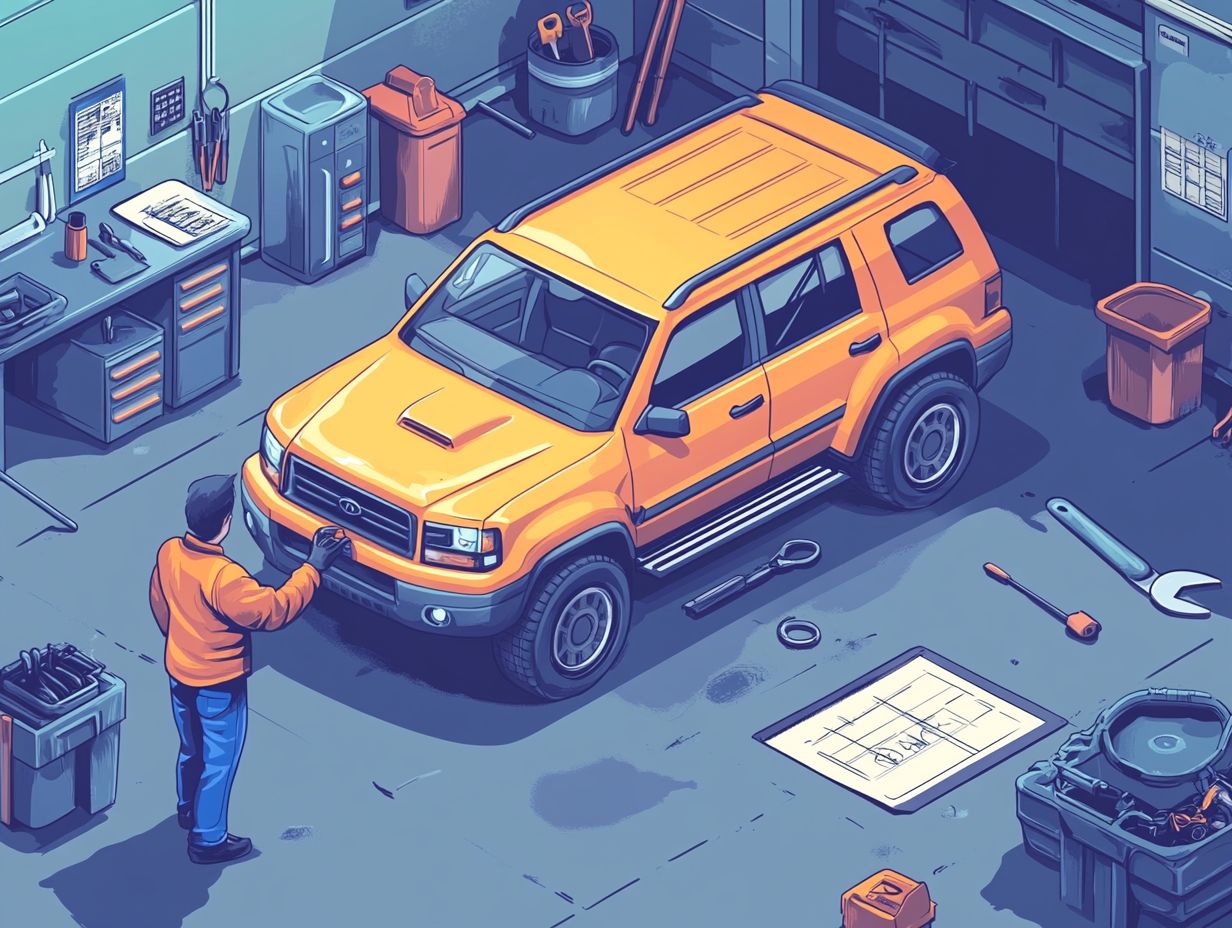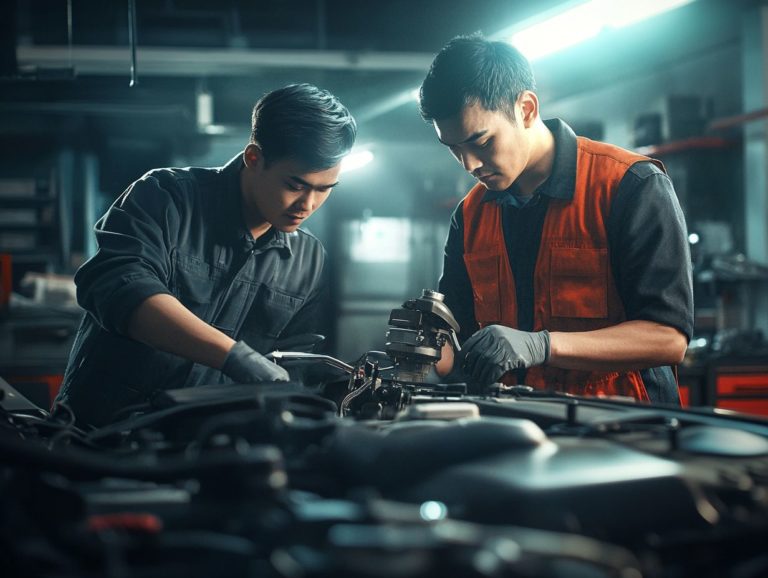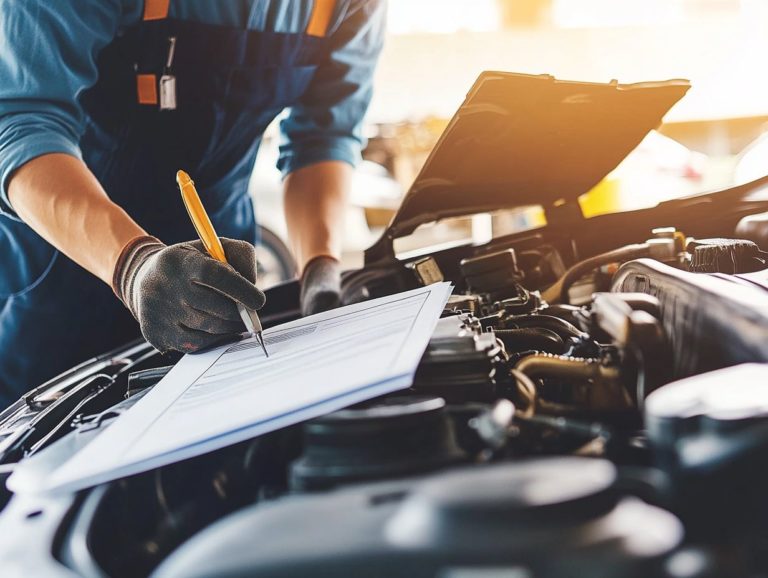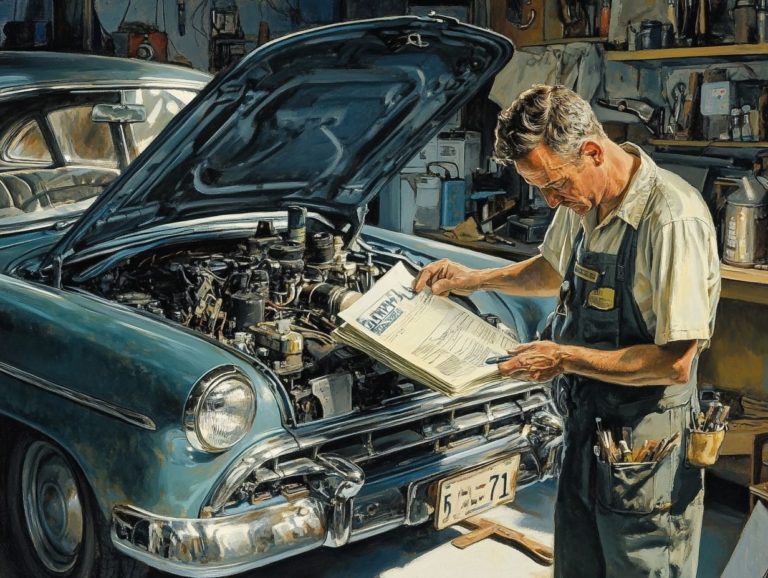The Best Maintenance Practices for SUVs
Regular maintenance is essential for ensuring your SUV runs smoothly and safely. From fundamental tasks such as oil changes and tire rotations to more advanced inspections and exterior care, each step is vital in prolonging the life of your vehicle.
This encompasses crucial maintenance practices, including tips for proper storage and driving habits, all aimed at keeping your SUV in peak condition for years to come. Get ready to discover exciting tips for keeping your ride in top shape!
Contents
- Key Takeaways:
- Why Regular Maintenance is Important
- Basic Maintenance Tasks for SUVs
- Advanced Maintenance for SUVs
- Maintaining the Exterior and Interior of Your SUV
- Tips for Extending the Life of Your SUV
- Frequently Asked Questions
- What are the best maintenance practices for SUVs?
- How often should I change the oil in my SUV?
- Why is it important to rotate my SUV’s tires?
- What fluids should I regularly check and replace in my SUV?
- How often should I have my SUV’s belts and hoses inspected and replaced?
- Are there any other important maintenance tasks I should not forget for my SUV?
Key Takeaways:

- Regular maintenance is crucial for the longevity and optimal performance of your SUV.
- Basic maintenance tasks like regular oil changes and tire rotations are simple and cost-effective ways to prevent major issues.
- Advanced maintenance, such as brake inspections and engine tune-ups, should be done by professionals to ensure safety and efficiency.
Why Regular Maintenance is Important
Regular maintenance is essential for ensuring your SUV’s longevity and optimal performance. By following a strict maintenance schedule, you can prevent unexpected repairs and promote engine health.
This diligence not only enhances fuel economy and performance but also preserves key safety features, ensuring your vehicle remains dependable on the road. Timely inspections help you pass emissions tests, which are vital for meeting environmental regulations.
Basic Maintenance Tasks for SUVs
Basic maintenance tasks for your SUV are crucial to keeping it in prime condition. Regular oil changes, tire rotations, and ensuring proper tire pressure form the cornerstone of effective vehicle upkeep.
Monitoring battery health, coolant levels, and replacing cabin air filters can greatly enhance your SUV’s performance and extend its lifespan. Taking these steps will ensure a smoother ride and protect your investment for years to come.
Oil Changes and Fluid Checks
Regular oil changes are essential for keeping your engine in peak condition and ensuring your SUV operates smoothly. Regular checks of fluid levels, such as coolant and brake fluid, are equally important to prevent overheating and maintain optimal braking performance.
The type of oil you choose for your SUV whether it is synthetic, which is made from chemical compounds rather than crude oil, or conventional significantly impacts the engine’s resilience against wear and tear. Semi-synthetic and fully synthetic oils are often recommended for their exceptional performance, especially in extreme conditions.
To keep everything in check, inspect the oil dipstick, coolant reservoir, and brake fluid levels at least once a month. It’s best to change the oil every 5,000 to 7,500 miles, or according to the manufacturer’s recommendations, to maximize engine efficiency and elevate overall vehicle performance, ultimately extending the life of your SUV.
Tire Rotations and Inspections
Tire rotations and inspections are essential for ensuring even tire wear and enhancing your driving safety. By regularly checking tire pressure and adhering to the recommended tire rotation schedule, you can significantly improve your vehicle’s traction and handling.
This maintenance not only extends the life of your tires but also optimizes fuel efficiency. Experts typically recommend rotating your tires every 5,000 to 7,500 miles, though it s always wise to consult your vehicle s manual for specific guidelines.
Additionally, checking tire pressure at least once a month is crucial, ideally when the tires are cold, to obtain the most accurate reading. Neglecting proper tire care can lead to uneven wear patterns, which decreases grip and response on the road, potentially compromising your safety during sudden maneuvers or in adverse weather conditions.
Maintaining your tires in peak condition is vital for achieving a reliable and enjoyable driving experience.
In conclusion, regular maintenance is not just a necessity but a smart investment. Taking the time to care for your SUV will ensure it remains safe, efficient, and enjoyable to drive for many years to come.
Advanced Maintenance for SUVs

Advanced maintenance tasks are essential for keeping your SUV in peak condition and ensuring it operates at optimal performance levels. This involves conducting thorough inspections of brake pads, performing engine tune-ups, and addressing any auto repairs that may arise over time. By prioritizing advanced maintenance, you can prevent costly issues later on and significantly enhance your overall driving safety.
Brake Inspections and Replacements
Brake inspections and replacements are vital touchpoints in vehicle maintenance that significantly influence safety. Regularly assess the condition of your brake pads and replace them when necessary to ensure optimal braking performance.
Neglecting this important aspect can lead to perilous situations on the road. Worn brake pads may signal trouble with signs such as squeaking, grinding noises, or decreased responsiveness. Check your brakes at least once a year or whenever you notice these warning signs.
Keep an eye on your brake fluid levels and ensure that your rotors are not warped to extend the lifespan of your braking system.
Routine inspections and smooth driving habits are crucial for maintaining your braking system. Ignoring brake maintenance can lead to escalating repair costs and compromised safety. Be proactive in your vehicle care!
Engine Tune-Ups and Inspections
Regular engine tune-ups and inspections are very important for keeping your engine in prime condition and maximizing its performance. These essential procedures involve checking and replacing spark plugs, which are parts that help start your engine, and ensuring that all performance components work well.
A comprehensive tune-up also requires a close look at air filters to guarantee they re free from dirt and debris, which can impact air intake and overall engine efficiency. Clean air filters prevent unnecessary strain on the engine, leading to improved fuel economy. Examine fuel injectors, which deliver the right amount of fuel for combustion, for clogs. Regular engine maintenance boosts performance and extends the engine’s lifespan.
To maintain peak efficiency, change air filters every 12,000 miles and periodically clean your fuel injectors. These straightforward maintenance steps can lead to enhanced fuel efficiency, reduced emissions, and a noticeably smoother ride.
Maintaining the Exterior and Interior of Your SUV
Maintaining both the exterior and interior of your SUV is crucial for preserving its aesthetic allure and comfort. Regular washing and detailing not only elevate the vehicle’s appearance but also safeguard its surfaces from wear and tear. Routine interior cleaning and timely replacement of the cabin air filter are important for creating a pleasant driving atmosphere.
Washing and Detailing
Regularly washing and detailing your SUV is essential for preserving its condition and visual appeal. Washing isn t just about cleaning the outside; it also means waxing, polishing, and using the right products for different surfaces.
Dedicate time to this routine to ensure that every nook and cranny is attended to, from the tires to the dashboard. Start with a thorough rinse to eliminate dirt and debris, followed by a high-quality soap specifically designed for automobiles. Use a clay bar to lift any embedded contaminants before polishing and waxing.
Choose products free from harsh chemicals to maintain your paint’s integrity. Regular detailing not only bolsters your SUV s appearance but also shields it against corrosion, ensuring its longevity and safeguarding its resale value.
Don t wait! Start your advanced maintenance today to keep your SUV running smoothly.
Interior Cleaning and Care

Interior cleaning and care are essential for ensuring a comfortable and enjoyable driving experience in your SUV. By regularly replacing the cabin air filter and vacuuming the interior, you maintain both air quality and hygiene while preserving your vehicle’s overall aesthetic.
Taking time for upholstery care is crucial. It helps prevent unsightly stains and extends the lifespan of your seats. Establishing a routine cleaning schedule not only enhances visual appeal but also reduces allergens, making every journey more pleasant for you and your passengers.
Utilizing the right tools and techniques such as a high-quality vacuum and effective fabric cleaners can truly transform your cleaning efforts. Changing the cabin air filter at recommended intervals improves air circulation, ensuring a fresher atmosphere inside your vehicle.
Ultimately, a clean interior elevates your driving experience, making it not just a necessity but a priority for you as a vehicle owner.
Tips for Extending the Life of Your SUV
Extending the life of your SUV hinges on a harmonious blend of proper storage, mindful driving habits, and regular care. By embracing targeted maintenance tips and adhering to a thoughtfully devised maintenance budget, you can notably elevate your vehicle s performance and longevity.
Proper Storage and Driving Habits
Proper storage and mindful driving habits are essential for extending the lifespan of your SUV. Keeping your vehicle sheltered in a garage or using a car cover during inclement weather can significantly prevent damage. Adopting smooth driving techniques will help reduce wear on performance parts, ensuring that your SUV remains in top shape.
Regularly checking tire pressure and maintaining proper inflation not only enhances fuel efficiency but also contributes to a more comfortable ride. Avoid sudden starts and stops; gradual changes in speed can help preserve the health of your drivetrain and brake system.
Parking on a flat surface rather than on inclines minimizes strain on the transmission. Set up a regular schedule for oil changes and filter replacements to keep your engine in peak condition, ultimately enhancing the longevity of your vehicle.
Frequently Asked Questions
What are the best maintenance practices for SUVs?
The best maintenance practices for SUVs include regularly changing the oil, checking and replacing fluids, rotating tires, and inspecting and replacing belts and hoses.
How often should I change the oil in my SUV?

It is recommended to change the oil in your SUV every 5,000 to 7,500 miles. However, this may vary depending on the type of oil used and your driving habits.
Why is it important to rotate my SUV’s tires?
Rotating your SUV’s tires helps to evenly distribute wear and tear, resulting in longer tire life and better performance. It also helps to maintain proper alignment and balance.
What fluids should I regularly check and replace in my SUV?
You should regularly check and replace the engine oil, transmission fluid, coolant, and brake fluid in your SUV. It is also important to check the power steering fluid and windshield washer fluid.
How often should I have my SUV’s belts and hoses inspected and replaced?
Belts and hoses should be inspected every 12,000 to 15,000 miles and replaced every 60,000 to 100,000 miles. However, it is always best to consult your owner’s manual for specific recommendations for your make and model of SUV.
Are there any other important maintenance tasks I should not forget for my SUV?
In addition to the aforementioned practices, it’s important to regularly check and replace air filters, spark plugs, and the battery. Keeping up with scheduled maintenance for your SUV can help prevent costly repairs and ensure it runs smoothly for years to come.






